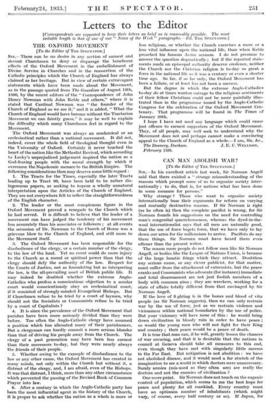CAN MAN ABOLISH WAR?
[To the Editor of THE SPECTATOR.] Sin,—In his excellent article last week, Sir Norman Angell said that there existed a " strange misunderstanding of the reasons which prompt some of us to organize society inter- nationally ; to do, that is, for nations what has been done in some measure for persons."
Why strange ? Those who want to organize society internationally base their arguments for reform on varying and mutually destructive reasons. If Sir Norman is right (as he often is) then the complete pacifist is wrong, for Sir Norman founds his suggestions on the need for controlling man's congenital quarrelsomeness, whereas the dyed-in-the- wool internationalist says that all men are naturally good, that the use of force begets force, that we have only to lay down our arms for the millennium to arrive. Pacifists do say these things. Sir Norman must have heard them even oftener than the present writer.
The reason more people do not follow men like Sir Norman Angell, or bodies like the League of Nations Union, is because of the large lunatic fringe which they attract. Doubtless any serious cause, or any clever publicist, for that matter, must suffer from the attachment of extremists, but the peace cranks and Communists who advocate (for instance) immediate and total disarmament are not just foolish members of a body with common aims ; they are wreckers, working for a state of affairs totally different from that envisaged by Sir Norman Angell.
If the love of fi ghting is in the bones and blood of vita people (as Sir Norman suggests), then we can only restrain war by the use of force, just as we restrain violence and viciousness within national boundaries by the use of police. But your visionary will have none of this : he would bring down civilization in bloody ruin in order to have peace ; so would the young men who will not fight for their King and country ; their peace would be a peace of death.
It is true that man can, if he will, greatly lessen the chances of war occuring, and that it is desirable that the nations in council at Geneva should take all measures to this end, even though they have met with singularly little success in the Far East. But mitigation is not abolition : we have not abolished disease, and it would need a far stretch of the imagination to see a world in which doctors were unnecessary. Surely armies (mis-used as they often are) are really the doctors and not the enemies of civilization ?
One more point. Sir Norman does not touch on the eugenic
control of population, which seems to me the best hope for- peace and plenty for all mankind. Every country must have an optimum number of inhabitants (which might vary, of course, every half century or so). If Japan, for
instance, had not been greatly over-crowded, she would not now be spreading fire and sword in China. Again, although we exclude undesirable aliens from these shores, we have no check on the quality or quantity of immigrants through the gate of birth. There should be, if we are working for a pacifist paradise, for not only are we suffering from a great burden of physical and mental defect, but I have no doubt that babies will be horn in the future as they have in the past, who will grow up Tories and Imperialists like the







































 Previous page
Previous page